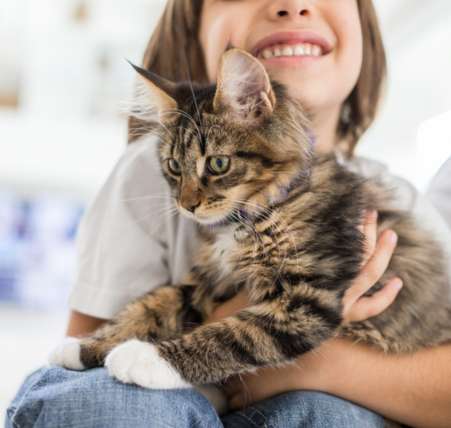Bereavement
Dealing with the Loss of a Pet
The death of a beloved pet can be very distressing. Our pets are not only members of the family, they are our faithful friends, our children’s devoted playmates and reliable, affectionate companions for the elderly or disabled. They enrich our day-to-day lives and their passing makes for a deeply felt loss.
There are many reasons why we may have to face a pet’s death:
- Terminal illness
- Old age or senility
- Fatal accident or unexpected occurrence
- Behavioural problems
- Long-term or chronic illness entailing heavy burdens in terms of care and/or finances
Most of these factors may place you in the heartbreaking position of facing your pet’s death or having to contemplate euthanasia. As an owner, you are responsible for your pet’s overall health and welfare. When his or her quality of life deteriorates, determining to do the humane thing and end the pet’s needless suffering may be one of the hardest decisions you will ever have to make. That is why bereavement often begins before the actual death of a pet.
Being Kind
Talk to your veterinarian. He or she can give you a complete assessment of your pet’s health and level of suffering, as well as assist you in evaluating your options. This will go a long way in helping you make your decision. You should also speak about your concerns with family and friends in order to enlist their support during this difficult time.
Adult Grief
Losing a friend, and that is what your pet is, is always very painful. Facing such a loss is not easy, and may evoke feelings of denial, anger, guilt or depression before acceptance is reached. These reactions are entirely natural and should be expressed. Everyone grieves in his or her own way. You may experience some or all of these feelings, in varying degrees and for different lengths of time. Acknowledging them is an important step in the mourning process, one that will help you understand why you may have withdrawn from, or lashed out at, people who care about you. You should realize that it is perfectly natural to need comforting. It will not only help you cope with your emotions and adjust to life without your pet, but may allow you, in the future, to provide welcome support to others around you who are experiencing the same loss.
Children’s Grief
MyVetOnline BereavementBe honest. Children are very intuitive and know when something is wrong. In wanting to safeguard them from a painful experience, you may feel it’s wiser to exclude them from the decision-making process. Once the decision is made, talk openly about what has happened. Provide your children with honest, simple answers that are appropriate for their age group, using terms they know and understand. Not only will they respect you for your honesty, but they will also be better prepared to deal with the situation.
Avoid euphemisms. Younger children can be confused by phrases like “went to sleep”. Indeed, employing such terms may lead to fear and cause some children to become anxious about actually going to sleep.
Encourage children to speak freely about their pet’s death and give them the opportunity to vent their grief and sadness. Share some of your own feelings and involve them in the pet’s funeral preparations, if any. This will help them deal with their concerns and give them the chance to say goodbye in their own way.
Make sure that children understand that no one is to blame for the pet’s death. Such an occurrence may arouse their curiosity about death and its consequences in general. A factual, straightforward approach, using answers or illustrations that are appropriate for their age group, will help guide children through the grieving process and lead to their acceptance of the pet’s death, without pangs of unnecessary guilt.

